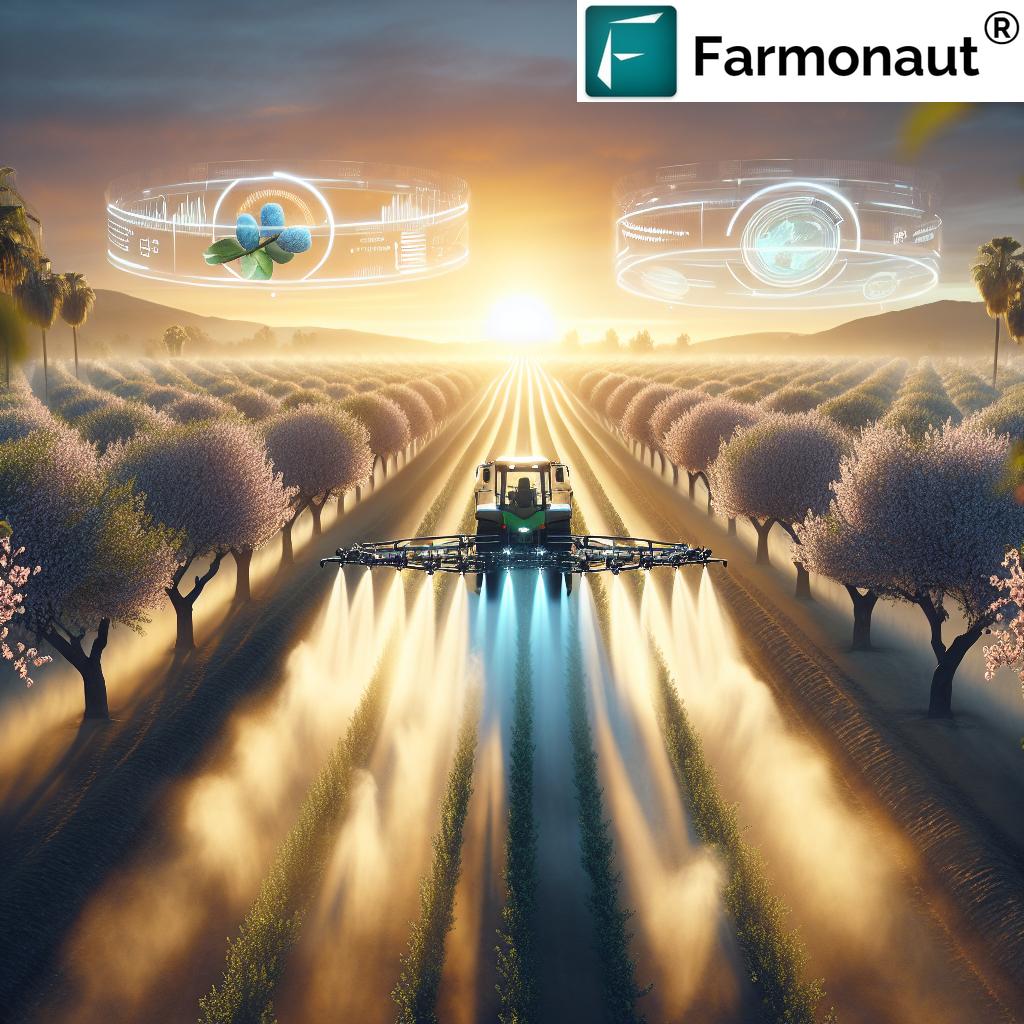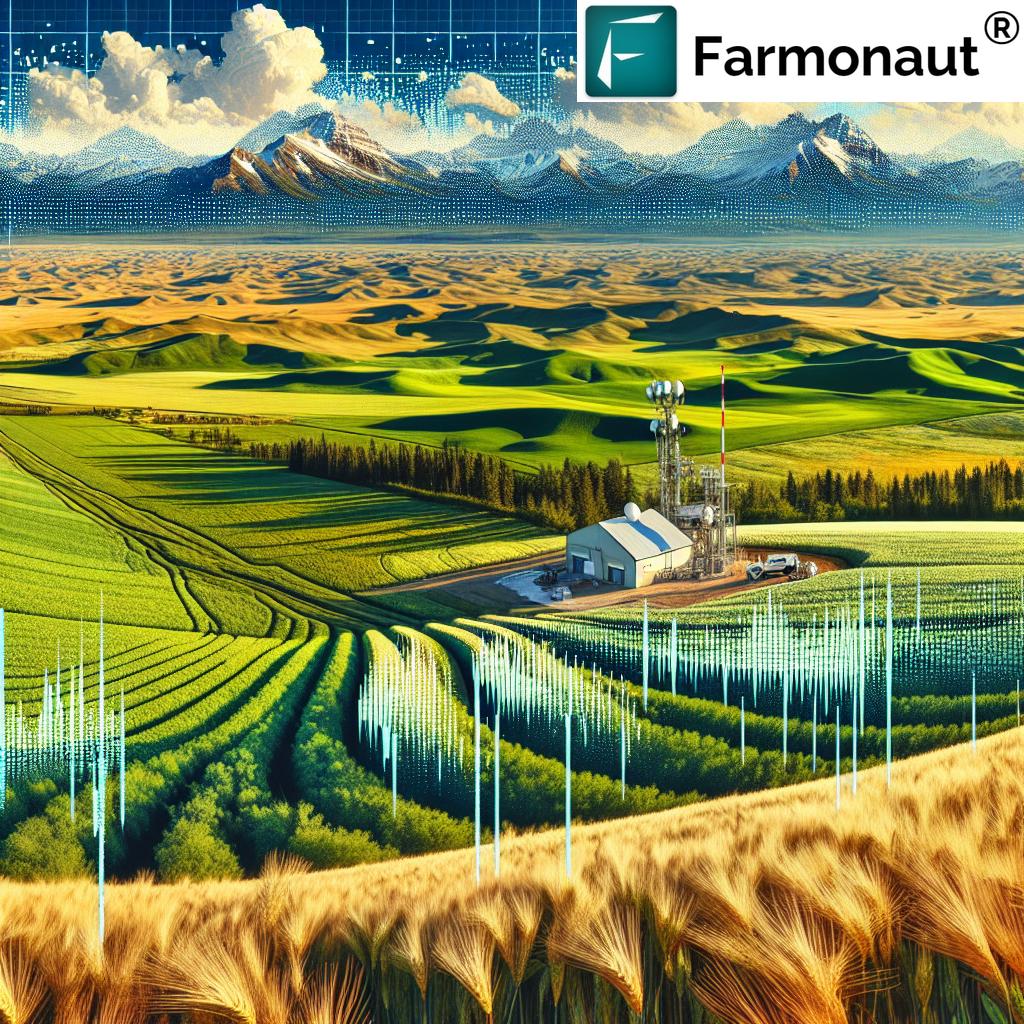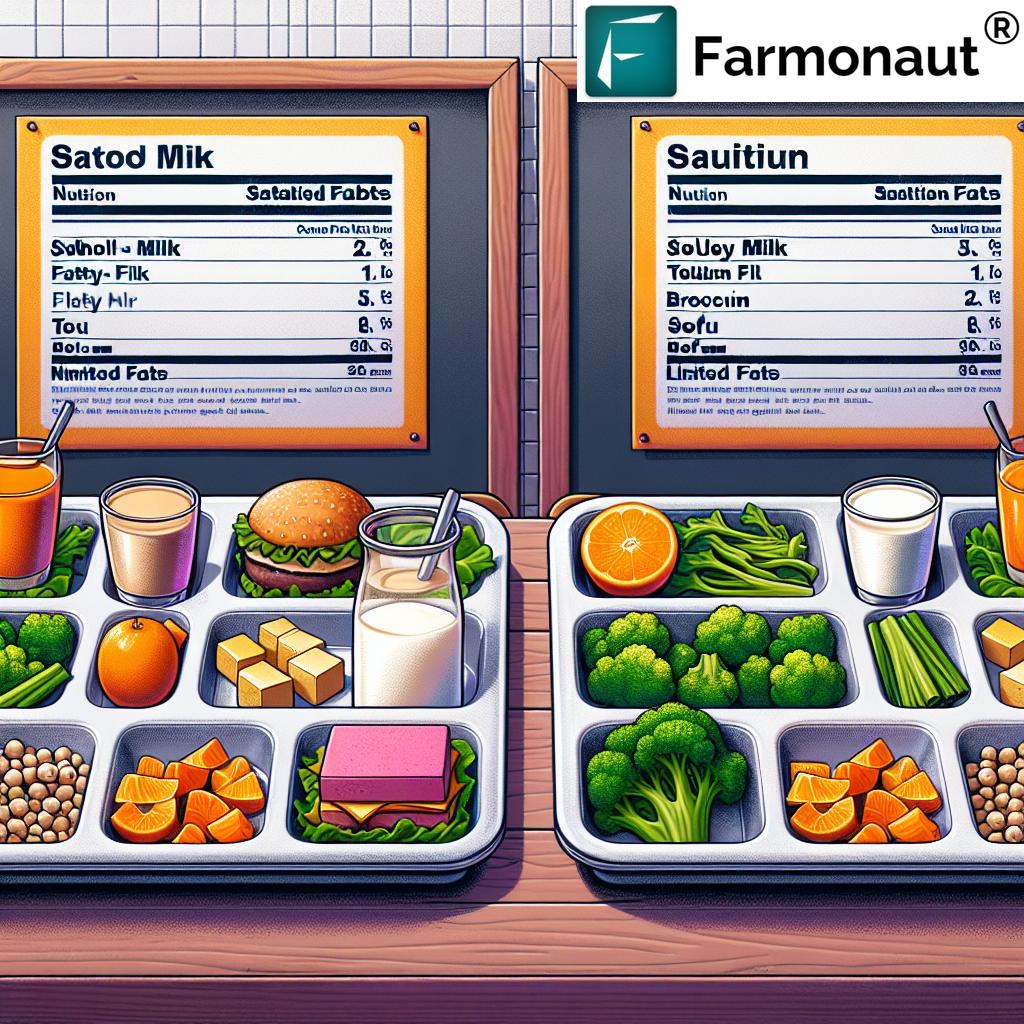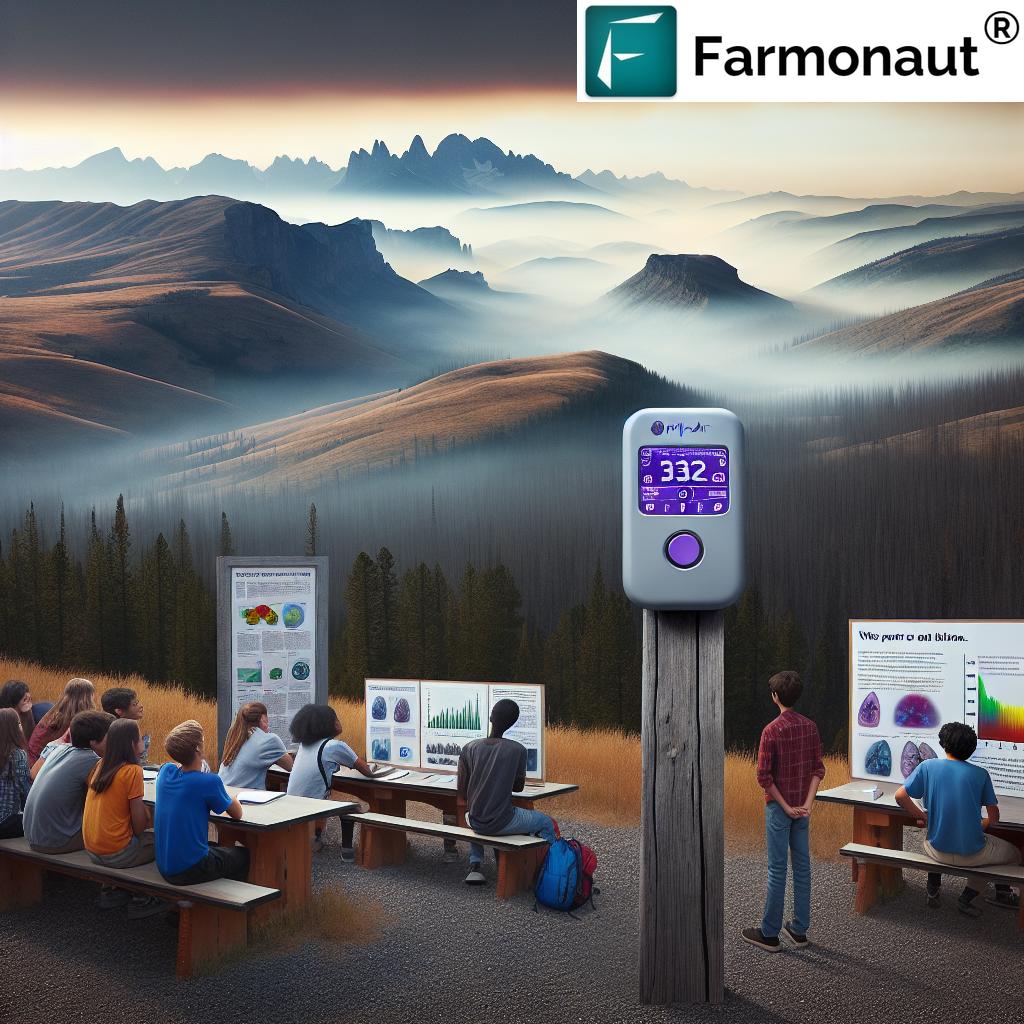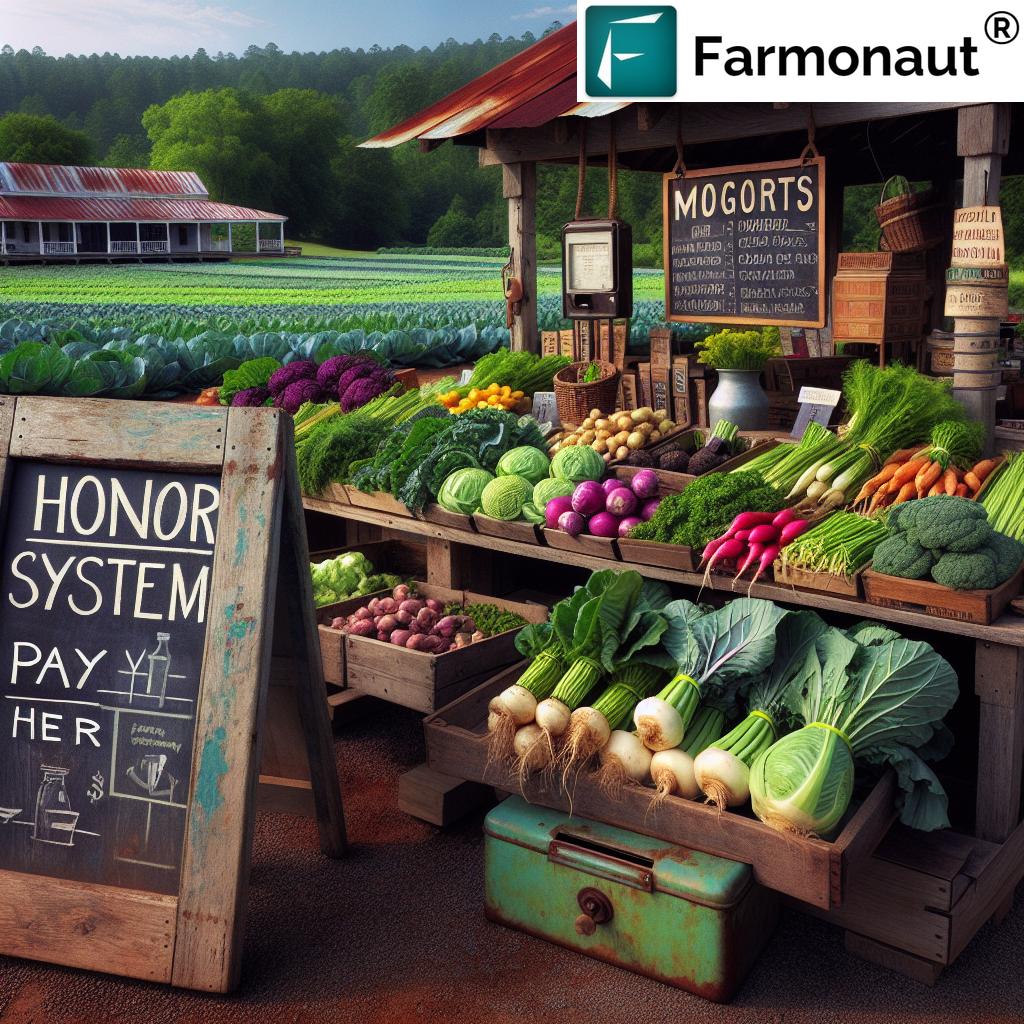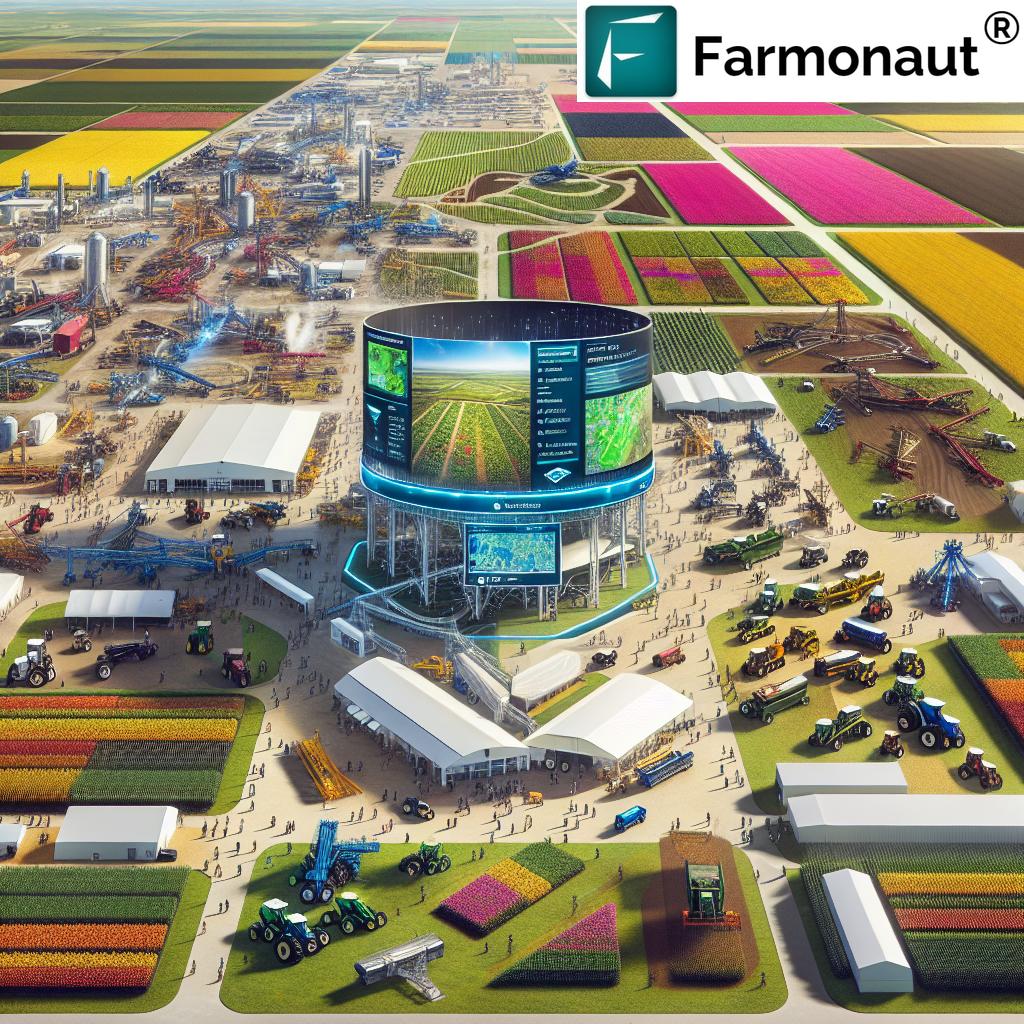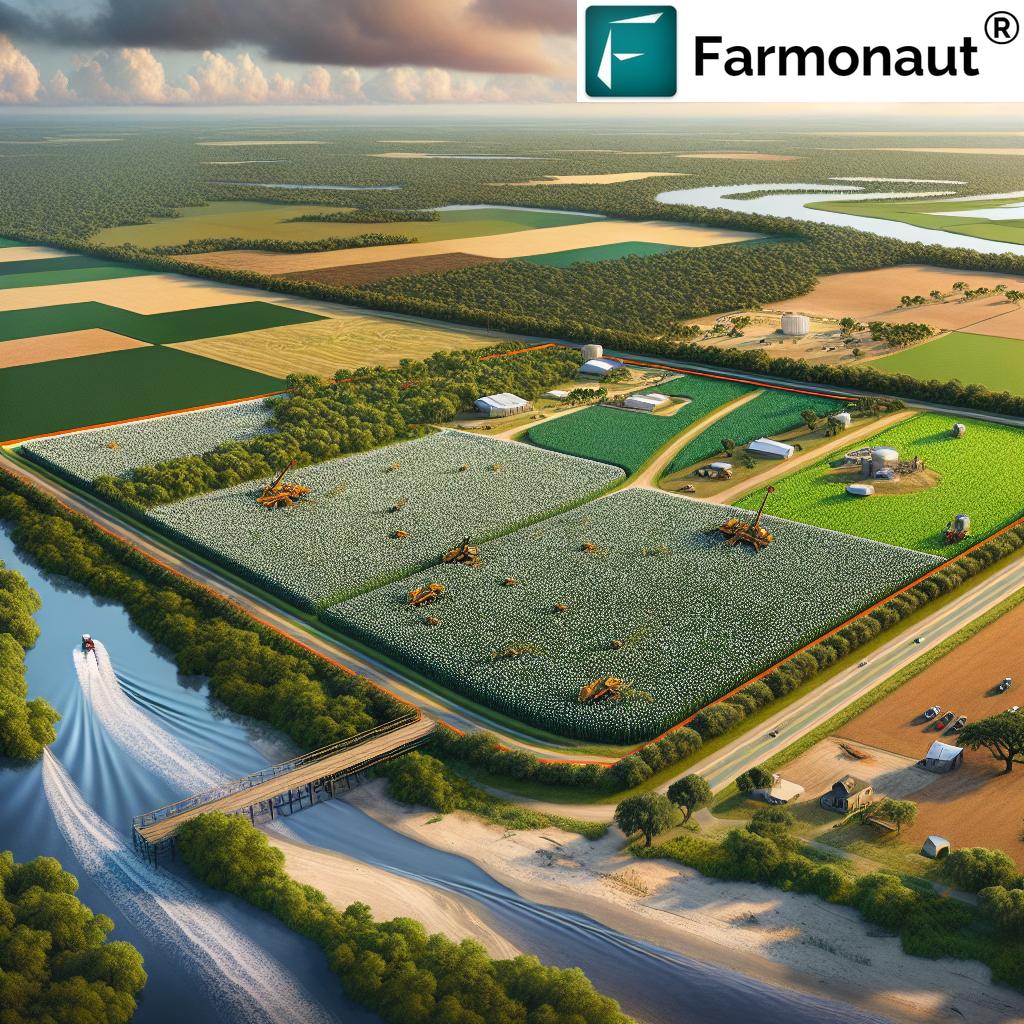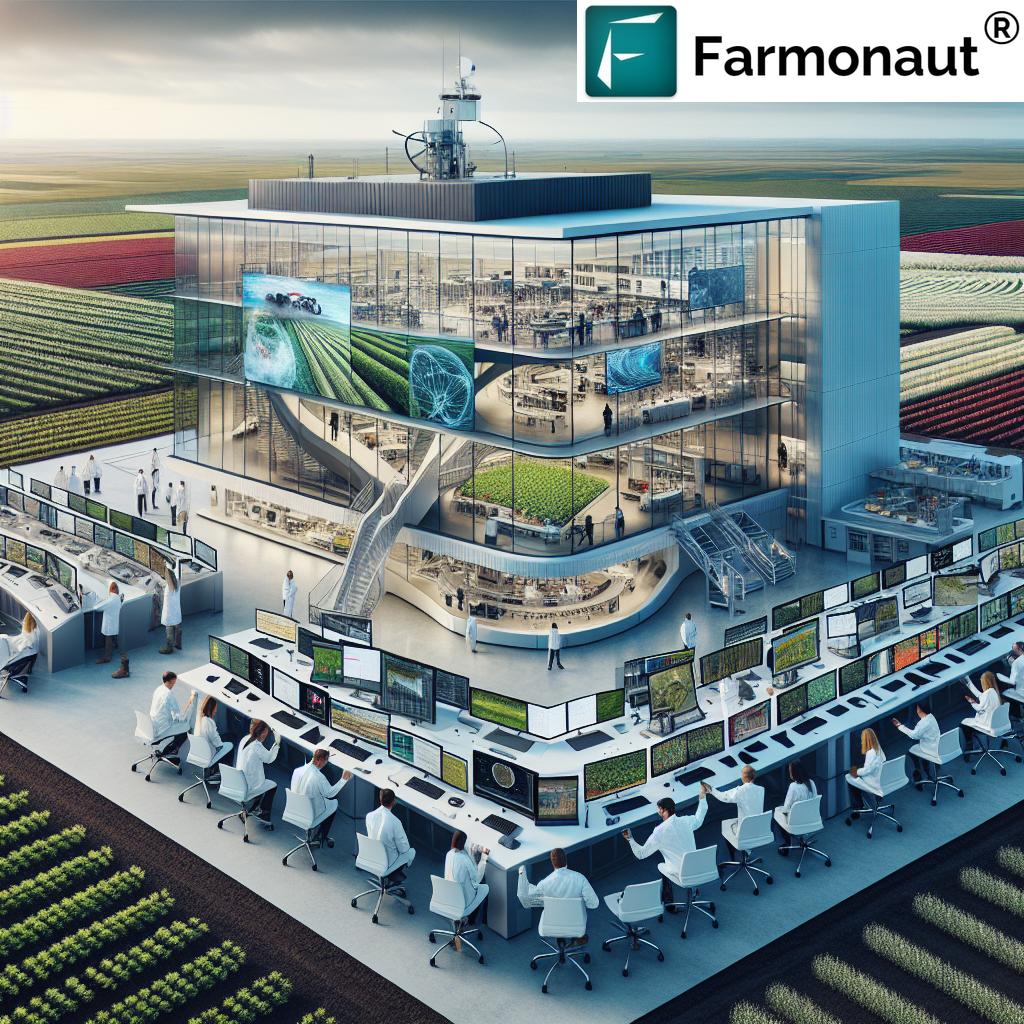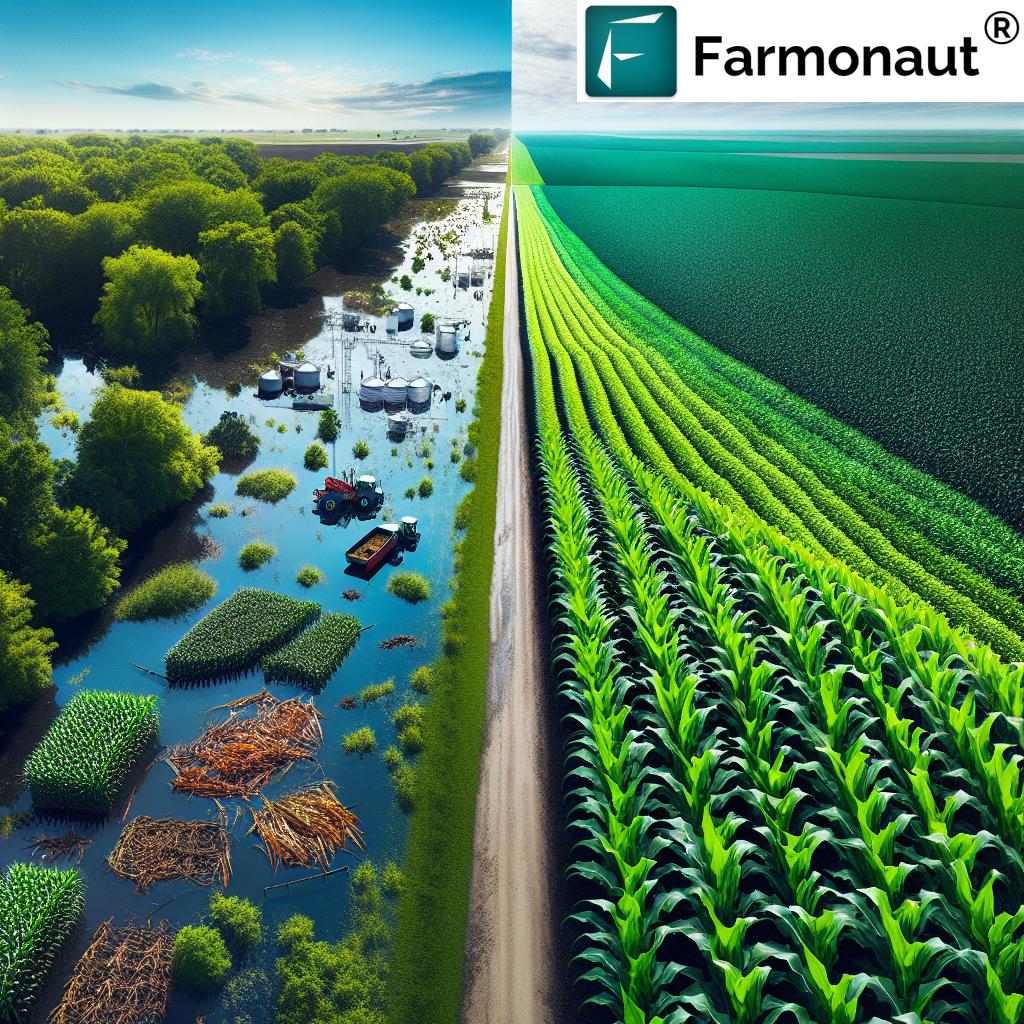Revolutionizing Rural Georgia: Farmonaut’s Smart Farming Solutions for Peanut Farms and Small-Town Agriculture
“Georgia’s peanut farms, covering over 800,000 acres, are now leveraging smart farming solutions for improved crop management.”
In the heart of rural Georgia, a quiet revolution is taking place. The state’s rich agricultural heritage, deeply rooted in small towns and family farms, is undergoing a remarkable transformation. At the forefront of this change is the integration of rural agriculture technology, bringing smart farming solutions to the forefront of peanut farms and small-town agriculture. As we delve into this fascinating intersection of tradition and innovation, we’ll explore how companies like Farmonaut are reshaping the landscape of farming in Georgia and beyond.
The Evolution of Georgia’s Agricultural Landscape
Georgia’s agricultural history is as rich and diverse as its soil. From the rolling hills of the north to the coastal plains of the south, farming has been the backbone of the state’s economy for generations. At the center of this agricultural tapestry lies the humble peanut, a crop that has defined Georgia’s farming identity for over a century.
- Georgia produces nearly half of the United States’ peanut crop
- Peanut farming techniques have evolved significantly over the decades
- Small towns across the state have been built around agricultural communities
However, the face of farming in Georgia is changing. As we move further into the 21st century, the integration of technology into agricultural practices is becoming not just an option, but a necessity for farmers looking to stay competitive in a global market.
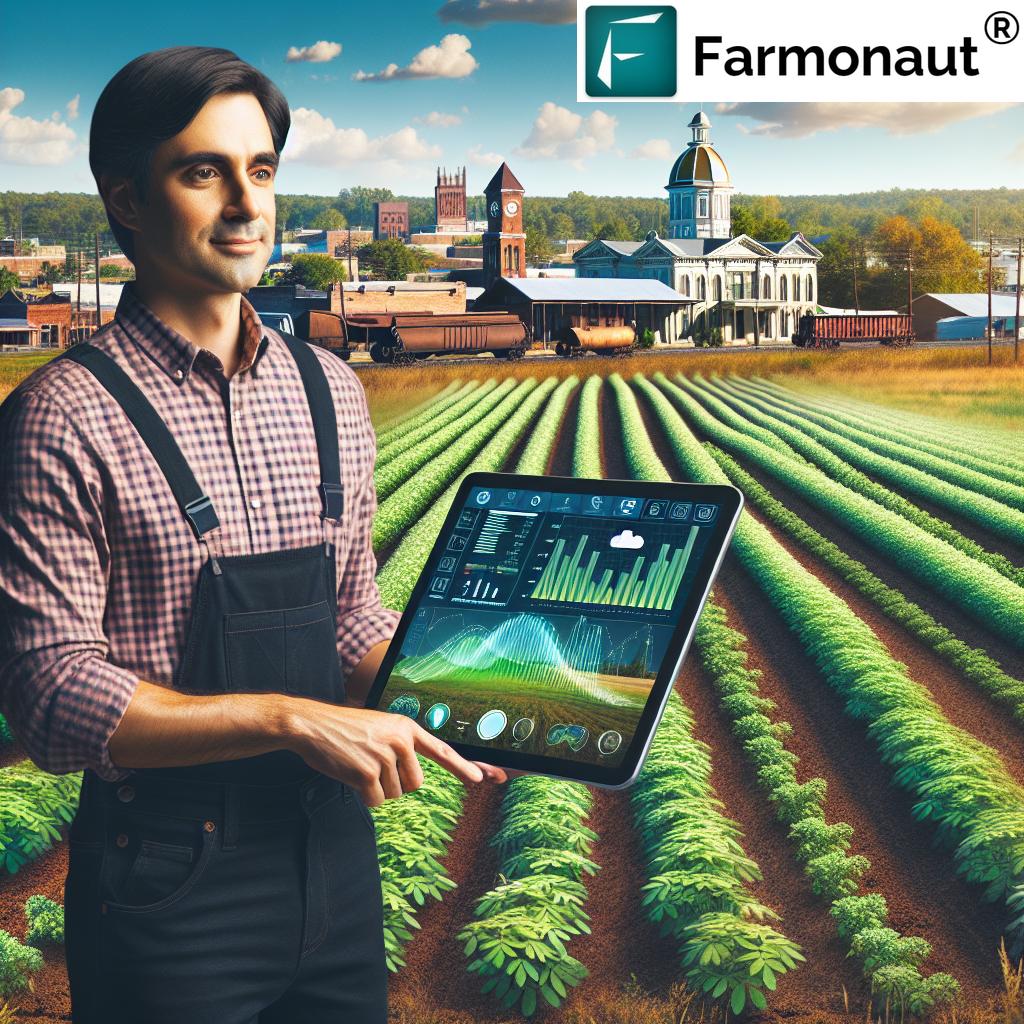
The Rise of Smart Farming Solutions
Enter the era of smart farming solutions. These innovative approaches to agriculture are revolutionizing how farmers manage their crops, from planting to harvest. At the heart of this revolution is precision farming tools, which allow for unprecedented levels of accuracy in farm management.
Farmonaut, a pioneering agricultural technology company, is at the forefront of this transformation. By leveraging advanced satellite-based farm management solutions, Farmonaut is making precision agriculture accessible and affordable to farmers across Georgia and beyond.
Key Components of Smart Farming
- Satellite-based crop health monitoring
- AI-driven advisory systems
- Blockchain-based traceability
- Resource management tools
These technologies are not just changing how farms operate; they’re reshaping the very fabric of rural communities. Small towns that have long been centers of agricultural activity are now becoming hubs of technological innovation.
Transforming Peanut Farming in Georgia
Peanut farming, a cornerstone of Georgia’s agricultural economy, is experiencing a renaissance thanks to these smart farming solutions. Traditional peanut farming techniques, while effective, often relied heavily on intuition and generational knowledge. Now, farmers can complement their expertise with data-driven insights.
Farmonaut’s platform offers real-time crop health monitoring through satellite imagery. This allows peanut farmers to:
- Detect early signs of crop stress
- Optimize irrigation schedules
- Manage fertilizer application more efficiently
- Predict yields with greater accuracy
By integrating these precision farming tools, peanut farmers in Georgia are seeing significant improvements in crop yields and resource efficiency.
The Impact on Small-Town Agriculture
The benefits of smart farming solutions extend far beyond individual farms. They’re having a profound impact on small-town agriculture across Georgia. Rural communities that have long been dependent on traditional farming practices are now embracing technology as a means of revitalization.
- Increased farm productivity is boosting local economies
- Young people are finding new opportunities in agritech
- Sustainable agriculture practices are preserving rural landscapes
This transformation is not just about technology; it’s about preserving a way of life while adapting to the challenges of the 21st century. Small towns across Georgia are finding that by embracing smart farming solutions, they can maintain their agricultural heritage while positioning themselves for a prosperous future.
Farm-to-Table Innovation
One of the most exciting developments in Georgia’s agricultural scene is the rise of farm-to-table innovation. This movement, which emphasizes locally sourced, fresh produce, is being supercharged by the adoption of smart farming solutions.
Farmonaut’s blockchain-based traceability system is playing a crucial role in this evolution. By providing a transparent, secure record of a crop’s journey from farm to consumer, it’s enhancing trust and authenticity in the food supply chain.
- Restaurants in Atlanta and other urban centers can trace the origin of their peanuts and other produce
- Consumers gain confidence in the quality and sustainability of their food
- Farmers can showcase their commitment to quality and sustainable practices
This farm-to-table revolution is not just changing how we eat; it’s reshaping the relationship between urban and rural Georgia, creating new connections and opportunities for collaboration.
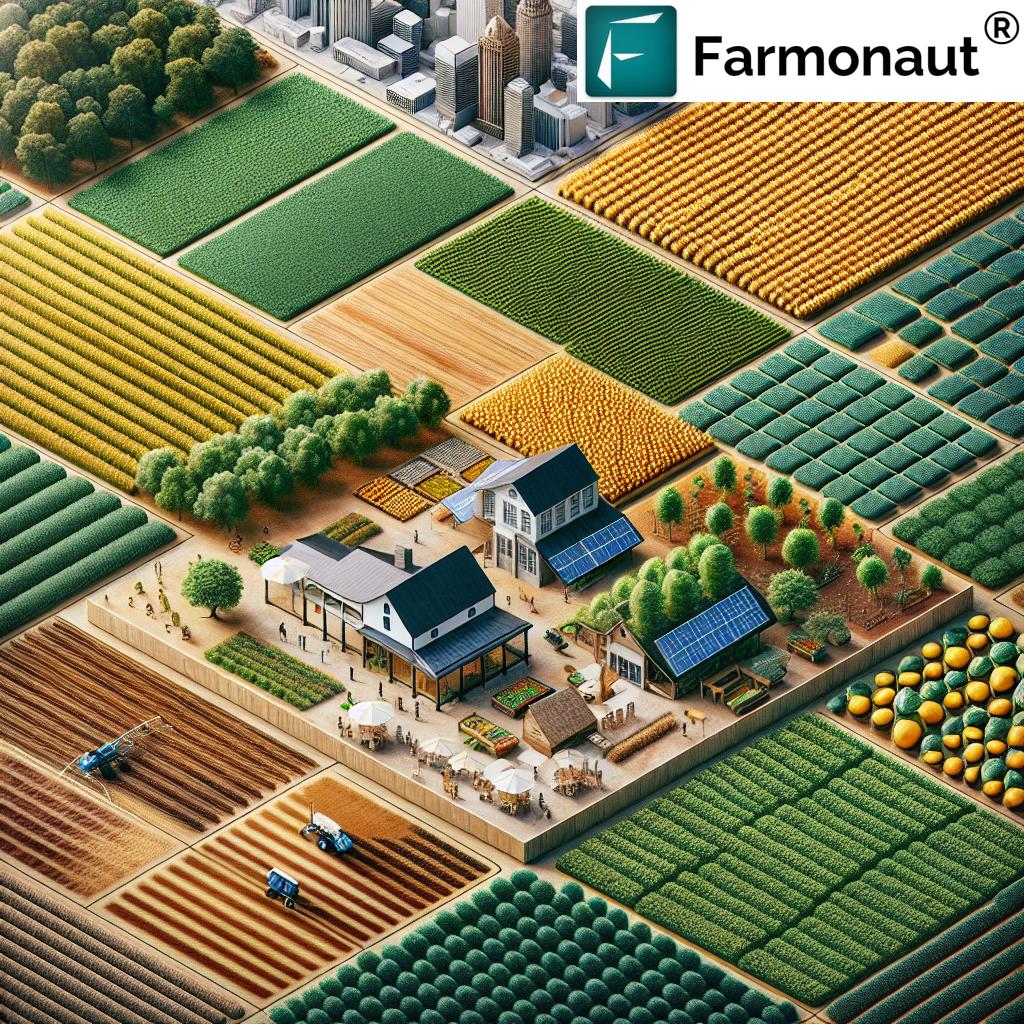
Sustainable Agriculture Practices
Sustainability is at the heart of the smart farming revolution in Georgia. As climate change poses increasing challenges to agriculture, farmers are turning to technology to help them adapt and thrive.
Farmonaut’s crop monitoring systems and agricultural data analytics are enabling farmers to implement more sustainable agriculture practices. By providing real-time insights into soil health, water usage, and crop needs, these tools allow farmers to:
- Reduce water consumption through precision irrigation
- Minimize chemical inputs by targeting applications
- Improve soil health through data-driven crop rotation
- Reduce carbon footprint through optimized resource use
These sustainable practices are not just good for the environment; they’re also improving the long-term viability of farms across Georgia.
“Farmonaut’s remote sensing technology can analyze up to 100,000 acres of farmland per day, revolutionizing agricultural data analytics.”
The Role of Remote Sensing in Agriculture
At the heart of many smart farming solutions is remote sensing technology. This innovative approach to farm management is transforming how farmers monitor and manage their crops.
Farmonaut’s platform leverages advanced satellite imagery to provide farmers with a bird’s-eye view of their fields. This remote sensing in agriculture allows for:
- Early detection of crop diseases and pests
- Accurate assessment of crop health and vigor
- Precise mapping of field variability
- Timely interventions to address issues
For peanut farmers in Georgia, this technology is proving particularly valuable. The ability to monitor large areas quickly and accurately is helping farmers make more informed decisions about everything from planting dates to harvest timing.
Bridging the Urban-Rural Divide
One of the most exciting aspects of the smart farming revolution in Georgia is its potential to bridge the urban-rural divide. As technology makes farming more efficient and sustainable, it’s creating new connections between the state’s rural agricultural centers and its urban hubs.
- Urban consumers are gaining a greater appreciation for the complexities of modern farming
- Rural communities are benefiting from increased investment in technology infrastructure
- New job opportunities in agritech are attracting young talent to rural areas
This urban-rural connection is particularly evident in the state capitol, Atlanta, where innovative farm-to-table restaurants are showcasing the best of Georgia’s agricultural produce, including its famous peanuts.
The National Implications
While our focus has been on Georgia, the implications of this agricultural revolution extend far beyond the state’s borders. The success of smart farming solutions in Georgia’s peanut farms and small-town agriculture is serving as a model for rural communities across the nation.
From the cornfields of Iowa to the vineyards of California, farmers are looking to Georgia as an example of how to successfully integrate technology into traditional farming practices. The lessons learned here have national significance, potentially reshaping American agriculture for generations to come.
Comparison: Traditional vs. Smart Farming Practices in Georgia Peanut Farms
| Aspect | Traditional Farming | Smart Farming with Farmonaut |
|---|---|---|
| Crop Monitoring Method | Visual inspection | Satellite imagery and AI analysis |
| Water Management | Scheduled irrigation | Precision irrigation based on real-time soil moisture data |
| Pest Control | Routine spraying | Targeted treatment based on early detection |
| Yield Prediction | Based on historical data and farmer’s experience | AI-driven predictions using multiple data points |
| Resource Efficiency | General guidelines | Optimized resource allocation based on field-specific data |
| Estimated Impact | Baseline | 15-30% increase in yield, 20-40% reduction in resource use |
The Future of Farming in Georgia
As we look to the future, it’s clear that the integration of smart farming solutions will continue to play a crucial role in shaping Georgia’s agricultural landscape. From the peanut farms of the south to the diverse agricultural operations across the state, technology is becoming an indispensable tool for farmers.
Farmonaut’s commitment to making precision agriculture accessible and affordable is helping to ensure that farms of all sizes can benefit from these advancements. As more farmers adopt these technologies, we can expect to see:
- Increased crop yields and quality
- More efficient use of resources
- Greater resilience in the face of climate challenges
- Enhanced traceability and food safety
The future of farming in Georgia is not just about technology; it’s about creating a sustainable, efficient, and prosperous agricultural sector that can continue to feed the state, the nation, and the world for generations to come.
Embracing the Agricultural Revolution
As we’ve explored throughout this article, the agricultural revolution taking place in rural Georgia is a testament to the power of innovation and the resilience of farming communities. By embracing smart farming solutions, peanut farmers and small-town agricultural operations are not just surviving; they’re thriving in the face of 21st-century challenges.
Farmonaut’s role in this transformation cannot be overstated. By providing accessible, affordable precision farming tools, they’re empowering farmers to make data-driven decisions that improve yields, reduce costs, and promote sustainability.
As we look to the future, it’s clear that the integration of technology into agriculture is not just a trend; it’s a necessity. The success of Georgia’s farmers in adopting these smart farming solutions serves as an inspiration and a model for rural communities across the nation and around the world.
The revolution in rural Georgia is just beginning, and the potential for growth and innovation is limitless. As we continue to bridge the gap between traditional farming practices and cutting-edge technology, we’re not just changing how we farm; we’re securing the future of agriculture for generations to come.
Get Started with Farmonaut
Ready to revolutionize your farming practices? Farmonaut offers a range of solutions to meet your needs:
- Web App: Access Farmonaut’s powerful tools from any browser
- Mobile Apps: Take Farmonaut with you in the field
- API Access: Integrate Farmonaut’s data into your existing systems
For developers interested in integrating Farmonaut’s technology into their own applications, check out our API Developer Docs.
Farmonaut Subscriptions
Frequently Asked Questions
Q: How does Farmonaut’s technology benefit small peanut farms in Georgia?
A: Farmonaut’s smart farming solutions provide real-time crop monitoring, precision irrigation advice, and yield prediction tools, helping small peanut farms improve productivity and resource efficiency.
Q: Can Farmonaut’s solutions be used for crops other than peanuts?
A: Yes, Farmonaut’s technology is versatile and can be applied to a wide range of crops, not just peanuts.
Q: How does remote sensing technology work in agriculture?
A: Remote sensing uses satellite imagery to analyze crop health, soil moisture, and other key factors, providing farmers with valuable insights without the need for on-ground sensors.
Q: Is Farmonaut’s technology affordable for small-scale farmers?
A: Yes, Farmonaut aims to make precision agriculture accessible to farmers of all sizes by offering flexible, cost-effective solutions.
Q: How does Farmonaut contribute to sustainable agriculture practices?
A: By optimizing resource use and providing data-driven insights, Farmonaut helps farmers reduce water and chemical inputs, promoting more sustainable farming practices.
As we conclude our exploration of how smart farming solutions are revolutionizing rural Georgia’s agriculture, it’s clear that the future of farming is bright. With companies like Farmonaut leading the way, peanut farms and small-town agricultural operations are well-positioned to thrive in the digital age. By embracing these innovative technologies, Georgia’s farmers are not just preserving their agricultural heritage; they’re cultivating a new era of sustainable, efficient, and prosperous farming for generations to come.









